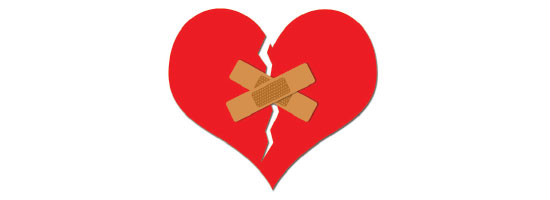When people speak of a broken heart, I often wonder why the heart? The heart has nothing to do with what we refer to as heartbreak. The ego is what gets broken and shattered. The heart is far too delicate an organ and has enough of a task just getting the blood circulated throughout the body. So why is it then that we refer to love lost as a broken heart? And, what is it really that we’re experiencing?
The typical feelings of rejection and disappointment hit us hard when we are on the receiving end. When a lover leaves us behind, it hurts. It hurts in our gut. And that very sensation of emptiness in the solar plexus makes us double over in pain and keeps us crying into the night.
These very reactions to the shock of rejection and loss also make our heart rate speed up and beat so fast that we feel it thumping out of our chest. If we try to speak in those moments of shock, we find ourselves choking on the words because our throats tighten, squeezing the words back down, and instead of speaking we cry. The pain is real; it’s physical and it happens to us all instinctually. However, it is the same set of bodily reactions we experience when we hear of the death of a loved one. If we can understand this, we can also recognise that this “grief response” is normal and accompanies any loss. Usually these feelings of pain, followed by numbness and sadness, last about three months. That’s why we experience healing over time. The trouble is that few of us are really prepared for romantic loss and rejection.
If it’s not heartbreak, then what is it? It’s our egos reacting to rejection.
If it’s not heartbreak, then what is it? It’s our egos reacting to rejection. When rejection hits, our egos get squashed back into its childhood stage and re-experiences the shame and humiliation of our early years when we were powerless to do much about it, except cry and throw tantrums. Interestingly enough, social and emotional pain does get internalised in the body and, believe it or not, everyday painkillers can help relieve the pain. They work just as well on pain caused by emotional hurt as those caused by injury, if it’s being experienced in the body.
Since we have an intense need to belong, when our lover rejects us it destabilises us and turns our world upside down. And it’s supposed to. We have these responses built into our psyche for survival. Because we are so uncomfortable when our ego is threatened by an act of loss or rejection, we may even get angry or aggressive before we recognise the need to seek out the company of others, and also to examine or change the behaviour that caused the rejection in the first place. So rejection can actually be good for us because it makes us change our behaviour in order to attract others.
Purchase issue #8 Vol. 7, to continue reading.

